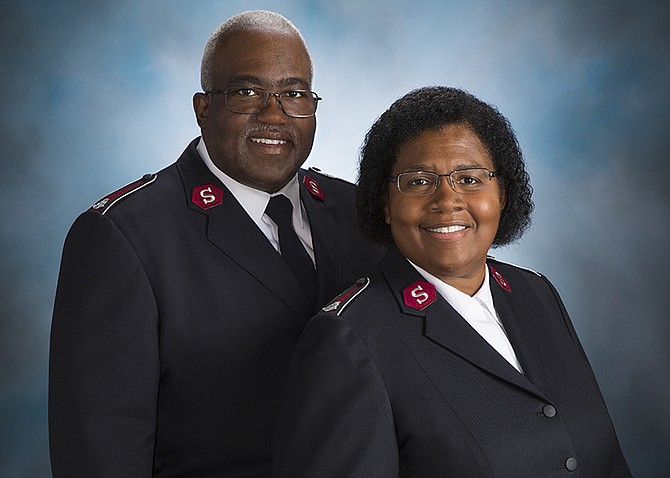From Ferguson To Chicago: New Salvation Army Commanders Make Black History
Commanders Make Black History
they were appointed to oversee The Salvation Army Midland Division headquartered in St. Louis. Now this dynamic husband and wife team has come to Chicago focused on tackling some of the growing needs of disenfranchised
communities who have been the victims of a double pandemic.
Lt. Cols. Richardson took over the
reins of leadership for The Salvation Army Metropolitan Division, spanning from Rockford to northwest Indiana, last summer, at a challenging time. In their role, they oversee 28 corps community centers and 50 social service programs for
The Salvation Army. While several programs have been paused since the start of the pandemic, many have adapted
and expanded as the organization has seen up to a fivefold increase in need , particularly in requests for food and emergency financial assistance.
“People who never thought they’d ne ed The Salvation Army have come to us,” L t. Col. Lonneal said. “A number of people are living paycheck to paycheck. So, we need to be prepared for what will come to help them to restore their lives.”
The Salvation Army’s services will continue, especially as the full to previous experience doing just that. Lt. Cols. Richardson led The Salvation Army Midland Division in St. Louis during the Ferguson riots. They were heavily engaged in the conversation about how to bring the community together, including pairing local youth with law enforcement for a weeklong summer camp.
Lt. Cols. Richardson were instrumental in the creation of the Ferguson Community Empowerment Center, a joint venture between The Salvation Army and the Urban League of St. Louis. The center, complete with after-school programming and services aimed at breaking the cycle of poverty, was built on the site of the QuikTrip gas station that was burned down during the unrest.
Lt. Cols. Richardson said building relationships will be key to trying to tackle both facets of the twin pandemic in Chicago. And they’re already getting started.
“We need to come together, put our best minds forward, to come up with how do we deal with this pandemic of racial divide in our country. If we don’t, we will once again be torn apart just as COVID has divided families, just as COVI D has changed our world,” Lt. Col. Lonneal said.
“It we do not come together and seriously
attempt to create a more just and p erfect union, then this pandemic will continue to divide, kill, and destroy us as a nation .” economic impact of the pandemic emerges. Lt. Col. Patty said partnerships will be important, especially in minority communities, in which the pandemic has had a disproport ionate impact. She said advocacy among community leaders and lawmake rs will also be important. But, Lt. Col. Lonneal said the disease that’s killed hundreds of thousands of Americans isn’t the only cha llenge. He said our city is
facing a twin pandemic: COVID and ra cial injustice.
“I think America has been on this 2 00-plus year journey of trying to develop a vaccine to deal with the racia l injustice,” he said.
Latest Stories
- ISBE and Lurie Children’s Launch Free, Data-Informed Resilience-Supportive Schools Illinois Initiative to Strengthen Student Mental Health and Resilience in All Schools
- Alzheimer’s Association Illinois Chapter Strengthens Commitment to Health Equity Through Diversity and Inclusion Initiatives
- Actress Draws From Life Experiences For Music And Acting Preparation
- Former Journalist’s Fragrance Company Promotes Self Care
- Doctors Provide Information About Resources For Women Experiencing Menopause
Latest Podcast
STARR Community Services International, Inc.

